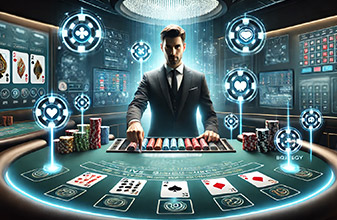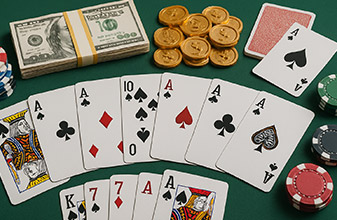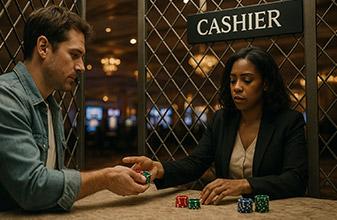Expected win vs. probability of reaching goal
This question seems to come up frequently. Sorry for the repost, but here is an explanation I provided some months back on Don's Domain:
The question is, "Why isn't setting a win goal an effective strategy, since it dramatically increases the chance of success?" Well, it's true--setting a win goal does increase the chance of short-term success. For example, in playing around in CVCX, the e.v. for a particular ten-hour trip is $1000. Among other things, this means that the chance of ending the ten hours $1000 or more ahead is about 50%. If you set a win goal of $1000, however, meaning you'll quit as soon as you're ahead $1000, the chance of reaching your goal skyrockets to almost 80%.
So how could setting a win goal not be a great strategy? The answer lies in the fact that, without a win goal, you actually might win more than $1000. In fact, about 50% of the time this is exactly what will happen. Though setting a win goal here increases the chance that you'll make $1000 by about 30%, it decreases the chance that you'll win more than $1000 to almost 0% (the exception is when the win that reaches your goal happens to push you over $1000. Even in this case, your win still won't be much over $1000). The bottom line is that, in the long run, the fewer number of hours you'll play using win goals will hurt your overall e.v. This is compounded if you always quit at your goal, even if it means leaving during a positive count.
In other words, the probability of reaching a given monetary goal is not a good measure of success or favorability. For example, consider a game with a 2% house edge. In this game, you plan to play for a maximum of 4 rounds and use a Martingale progression. You set a win goal of 1 unit. The probability of reaching this goal is .49 + .51*.49 + .51*.51*.49 + .51*.51*.51*.49 = 93.23%. However, the probability that you'll win more than 1 unit is 0%, and, in the 6.77% times that you do lose, you'll lose more (usually far more) than 1 unit. Your e.v. remains constant at -2%, despite the 93.23% chance of reaching your goal. The negative e.v. reflects the unfavorability of this game; the positive probability of reaching your goal is misleading.
Instead of setting monetary goals, it is more useful to set a temporal goal. That is, set a goal for the number of hours played. The more you play an advantage game, the more you're likely to win. Such goals are also good psychologically--you have more control over how many hours you play than you do over the outcome.
David










